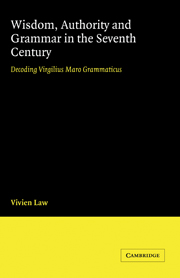Book contents
- Frontmatter
- Contents
- Preface
- Abbreviations
- Introduction
- 1 The outer layers: parody and word-play
- 2 The wisdom tradition
- 3 Avarice and the four keys to wisdom
- 4 The multifarious nature of wisdom
- 5 Heretical knowledge? The constitution of man
- 6 The Epistolae: Virgilius' Retractatio?
- 7 Concealment of mysteries: the techniques of secrecy
- 8 Virgilius and the seventh century
- 9 Conclusion
- Appendix 1 Epistola II 14-93: The vocative of ego
- Appendix 2 Epitome XV: The catalogue of grammarians
- Notes
- Works cited
- Index
2 - The wisdom tradition
Published online by Cambridge University Press: 10 November 2009
- Frontmatter
- Contents
- Preface
- Abbreviations
- Introduction
- 1 The outer layers: parody and word-play
- 2 The wisdom tradition
- 3 Avarice and the four keys to wisdom
- 4 The multifarious nature of wisdom
- 5 Heretical knowledge? The constitution of man
- 6 The Epistolae: Virgilius' Retractatio?
- 7 Concealment of mysteries: the techniques of secrecy
- 8 Virgilius and the seventh century
- 9 Conclusion
- Appendix 1 Epistola II 14-93: The vocative of ego
- Appendix 2 Epitome XV: The catalogue of grammarians
- Notes
- Works cited
- Index
Summary
Few authors are more single-minded than an early medieval grammarian. From the opening sentences on the parts of speech, or speech-sounds or grammar itself, to the final remarks on the interjection, their attention bears upon the traditional stuff of grammar and on that alone. Commentators follow the words of their text with as much solicitude as their colleagues in biblical exegesis; seeming digressions are keyed closely to the text, as when examples in a list of neuter nouns in -er or of nouns which are always plural in form prompt a digression on the origin of truffles or on the gods after whom the days of the weeks are named. Not so Virgilius. Apart from their extraordinary content, the non-grammatical portions of his work are integrated into the text on the loosest of pretexts. Indeed, the reader cannot help wondering whether the usual relations are reversed: whether grammar is the pretext and the digressions the real substance. Right at the beginning Virgilius breaks with tradition, opening the Epitomae with a chapter on wisdom. Throughout the work wisdom remains one of the most prominent themes, whether in repeated descriptions of its nature and subdivisions, or in exhortations to its ceaseless pursuit, or in the curious riddling puzzles of the final pages. Virgilius' preoccupation with wisdom transcends any routine genuflexion. Nor can it reasonably be considered part of the apparatus of grammatical parody, being absent from grammars at large and hence hardly susceptible to comic exaggeration. Wisdom mattered to Virgilius, just as it mattered to the many ancient and medieval authors and compilers of the vast and as yet hardly studied corpus of post-biblical wisdom literature.
- Type
- Chapter
- Information
- Wisdom, Authority and Grammar in the Seventh CenturyDecoding Virgilius Maro Grammaticus, pp. 22 - 40Publisher: Cambridge University PressPrint publication year: 1995

